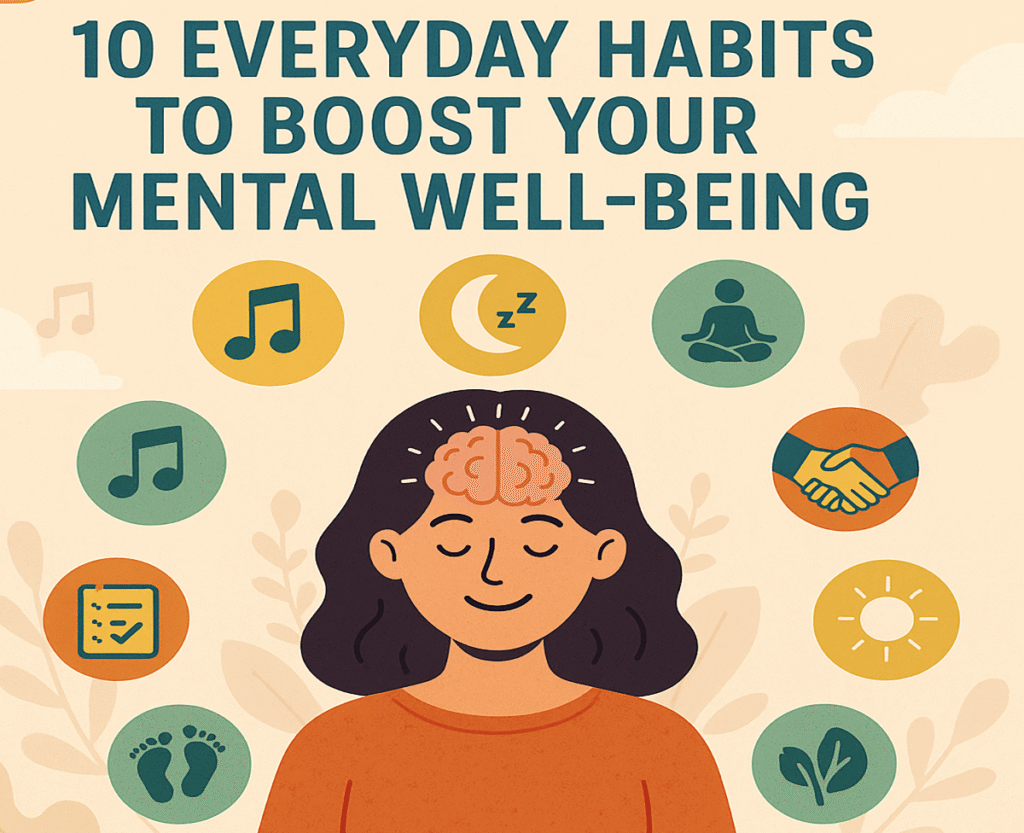
10 Everyday Habits to Boost Your Mental Well-Being
In today’s fast-paced world, mental health and well-being are as important as physical health. Stress, anxiety, and mood disorders are increasingly common, but small, daily habits can make a large disruption in how we feel, think, and behave. 10 scientifically proven, supported habits to help improve your mental well-being, starting today.
- Prioritize Quality Sleep
Sleep is foundational to mental health. During deep sleep, your brain processes emotions and consolidates memories. Constantly falling asleep more is correlated with a higher risk of depression and anxiety।
Trick: Try not to go to bed late and limit screen time before bed.
- Move Your Body
Exercise is not just for your physical body—it’s a powerful mood enhancer. Physical activity boosts endorphins and serotonin, brain chemicals that reduce stress and promote happiness.
Tip: Aim for at least 30 minutes of moderate exercise on most days of the week.
- Eat for Your Mind
What you eat influences how you feel. Eating a diet high in processed foods, sugar, and unhealthful fats is known to cause poorer mental health, while diets high in whole foods, omega-3 fatty acids, and fiber support brain function.
Tip: Get leafy greens, fatty fish, nuts, and whole grains into your daily meals.
- Practice Mindfulness and Meditation
Practicing mindfulness keeps your focus on the here
and now. Consistent meditation lowers activity in the amygdala, the part of the
brain linked to fear, and boosts gray matter in regions tied to self-awareness
and emotional control..
Tip: Practicing mindfulness for just 10 minutes each day can lead to visible improvements.
- Stay Connected
Strong social connections protect against stress and mental deterioration. Loneliness, on the other hand, can worsen the risk of depression and cognitive decline.
Tip: contact a friend join a group in your area or simply spend time with people you care about.
- Limit Social Media Use
Too much time on social media can increase a sense of inadequacy, anxiety, and isolation. The curatorial nature of online content often leads to unrealistic comparisons.
Tip: Use social media intentionally and take regular digital detox breaks.
- Set Manageable, Realistic Goals
Goal Setting provides clarity and purpose. Completers of even small goals can increase motivation, confidence and self – esteem.
Tip: Apply the SMART framework—Specific, Measurable, Achievable, Relevant, and Time-bound..
- Practice Gratitude
Gratitude makes you move from a state of lack to a state of abundance. It actually reduces negative emotions and allows you to cope better in difficult times..
Tip: You should write down 3 things in a gratitude journal every day you’re thankful for.
- Get Sunlight Exposure
Exposure to sunlight helps regulate circadian rhythms and creates serotonin. A lack of sunlight exposure has been linked with low mood and conditions such as seasonal affective disorder (SAD).
Tip: Spend 15–30 minutes outdoors each day, especially in the morning.
- Limit Alcohol and Avoid Substance Abuse
Alcohol and drugs can temporarily hide stress or sadness, but will mostly just get worse over time. They interfere with brain chemistry, sleep, and emotional regulation.
Tip: Seek healthier coping mechanisms and reach out for support if needed.
Final Thoughts: Backed by Science
Mental well-being is a continuous, dynamic process which depends on daily choices and lifestyles. While no one strategy works for everyone, practicing these habits consistently will lead to significant improvements in mood, clarity, and overall life satisfaction.
🔬 Scientific Insight:
A 2020 review published in The Lancet Psychiatry concluded that lifestyle modifications—such as improved sleep, regular exercise, and healthy eating—are as effective as medication for some mild to moderate mental health conditions. Additionally, research in Frontiers in Psychology supports that integrating holistic habits like mindfulness and social connection can boost emotional resilience and cognitive function over time.
By making these habits a part of your routine, you’re not just investing in your mental health… you’re nurturing your whole self
